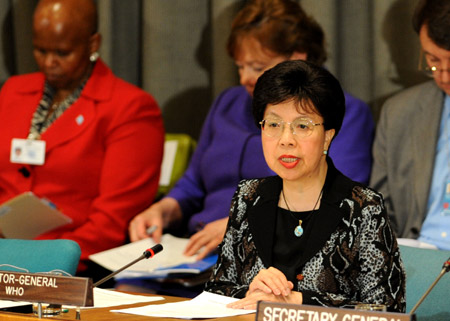The World Health Organization (WHO) Director-General Margaret Chan Monday urged senior government officials to place "fairness" at the core of decisions to protect the most vulnerable against major worldwide crises.
Global warming, hikes in fuel and food prices, the economic meltdown and now the A/H1N1 influenza pandemic hit hardest in developing countries, Chan told senior government officials and international experts attending the Secretary-General's Forum on Advancing Global Health.
There is growing recognition that "blind faith in economic growth and gain as the be-all, end-all, cure-for-all has been misplaced," Chan told the meeting at UN Headquarters in New York.
|

|
|
World Health Organization (WHO) Director-General Margaret Chan speaks during the Forum on Advancing Global Health at UN headquarters in New York, the United States, June 15, 2009. Chan on Monday urged senior government officials to place "fairness" at the core of decisions to protect the most vulnerable against major worldwide crises. [Xinhua] |
"Fairness, I believe, is at the heart of our ambitions in global health," said Chan. A failure to put equality at the center of health-care policy decisions is "one reason why the world is in such a great big mess."
Characterizing globalization as a rising tide that lifts "the big boats, but swamps or sinks many smaller ones," Chan said that the financial crisis has "proved highly contagious and this contagion showed no mercy and made no exceptions on the basis of fair play."
Even the level of preparedness for and capacity to cope with the H1N1 influenza outbreak in recent months are strongly biased towards wealthy countries, Chan said.
"Differences in income, life expectancy, and opportunities are greater now than at any time in recent history," Chan said. "These extremes of privilege and misery are often a precursor for social breakdown."
She suggested that one method for achieving fairness would be for more countries to embrace primary health care.
A primary health care approach introduces greater fairness as well as efficiency, and allows health systems to reach their potential as cohesive, stabilizing social institutions, Chan said. After addressing the forum, she told reporters that "health investment will bring economic progress and more wealth."
In his opening address to the forum, Secretary-General Ban Ki-moon said that healthy people have improved life expectancy, go to school, are more productive, take fewer days off work, have lower birth rates and thus invest more in fewer children.
|

|
|
Forum on Advancing Global Health is held at UN headquarters in New York, the United States, June 15, 2009. UN Secretary-General Ban ki-moon and World Health Organization (WHO) Director-General Margaret Chan presided over the Forum on Monday. [Xinhua] |
"Health is the tie that binds all the Millennium Development Goals (MDGs) together," he said, referring to the globally agreed anti-poverty targets with a 2015 deadline.
Eradicating poverty, illiteracy and the other challenges the MDGs seek to tackle will not be met without reaching the health targets, said Ban. "That is why global health is a top priority for me."
The one-day forum aimed at elevating the global health debate and engaging leaders from all sectors, including government ministries, UN agencies, civil society, business, philanthropy and academia, to build on the momentum and work in intense coordination to maximize the impact of global health interventions on the ground.
(Xinhua News Agency June 16, 2009)